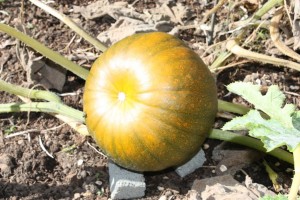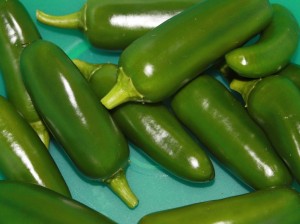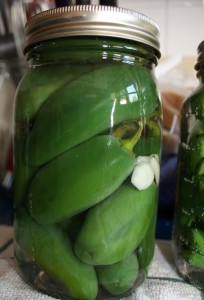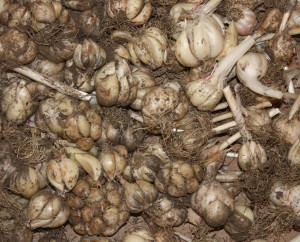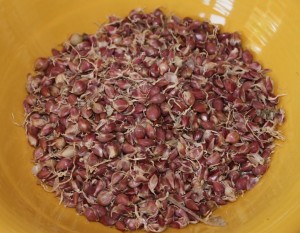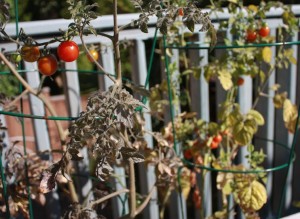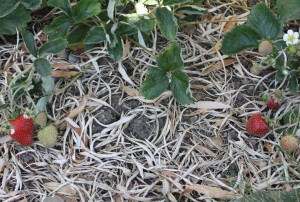I guess I never explained why I didn’t post for quite a while there the last couple of weeks. Mostly I was out of town for 4 days. Then I was 4 days behind on everything when I got back. Life is full of complications.
Luckily, the weather held out this weekend so I could finally get some long-neglected gardening done after RiverFest. Or, it being the end of the season, de-gardening. The days are sunny and warm, but the nights are getting longer and cooler, and the garden looks pretty much done for the year (see pictures below).
Last Sunday was all about putting planter soil in storage, putting dying plants in the compost, and harvesting the last of the crops.
Talking to friends and neighbours, I was not the only one who had a less-than-stellar gardening year. The wet cold spring meant everything was a little late starting, and the dry hot August meant keeping things irrigated was a constant battle.
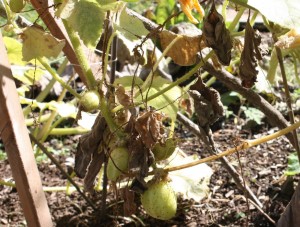 |
| Cukes, still producing (kind of) in October. |
The lone zucchini plant that survived the late cold spring seemed to like the trellising: stretching 8 feet across the top, and 8 feet back the other way. There was plentiful green vine and lots of flowers, but only a few actual zucchinis: Hand-pollination definitely helped, because once a gourd got going, they grew fast and huge. We ate the last of the season’s crop last night. We also had a pumpkin plant survive and produce one nice-sized round gourd. The vine has almost died off from the cold, so final ripening will happen indoors. I haven’t carved Jack-o’-lantern in a few years, this should be fun.
The cold has also spelled an end to growth of our peppers, another crop that was so late starting that the hot dry August and September were just enough for a semi-crop. We only grew jalapenos this year (we had grown red chillis and habanero in the past – we still have a jar of habaneros from two year ago that are potentially lethal). We harvested them this weekend and pickled them along with some fresh garlic.
This was a great year for the garlic, and our root cellar is – um – fragrant with hanging vines. We will not be buying those ubiquitous plastic socks of garlic from China any time soon. I also harvested the florettes from the garlic and have thousands of little bulbs. They will go in the ground this fall, and will produce “seed bulbs” next summer, which will in turn be harvested and re-planted. Garlic from seed like this is a two-year project, but this is one crop that loves my garden so much and produces so much, that I am willing to take the time.
While harvesting Garlic, I also ran into the few “volunteer” potatoes in the garden. This whole garden project began a few years ago when I tore the grass off of half of my front lawn and planted potatoes. The one thing about potatoes: once you plant them, they never really go away. I only had a half dozen or so this year, but they are like free surprise food when you find them.
I also had three “volunteer” sunflowers from last year’s crop. The birds got at the seeds of two of them long before I could harvest them, and spread them about the garden, so no doubt there will be more volunteers next year. The one I saved I will probably take to Saturna Island and spread the seeds on a small, sunny field of weeds to see if they prosper, or even out-compete the Scotch Broom and nettle. It’s a shot in the dark.
The only tomatoes we grew this year were a few planters worth of cherry varieties on our sunny back deck, and they are pretty much done now.
A spring crop of beets grew quickly and got eaten almost as fast, and I just had no luck with my cabbage and broccoli starters.
The weather was good for one crop this year especially: berries. We replaced our hedge with about 10 blueberry plants a couple of years ago, and they pumped out a cup or two of blueberries a day for the better part of three months. Last year they were beaten pretty badly by aphids, and this year the hailstorm we had in May caused a lot of leaf damage, but the berries arrived and kept producing on all but one plant. I planted strawberries as groundcover under a lot of the plants this year, and they are –unbelievably for October- still producing a few berries.
Next year’s strategy is to reduce and concentrate. Instead of growing in the ground, I am going to install a couple of raised beds and take a more dedicated approach to rotating crops. The planters will hopefully allow me to better control water and nutrient levels, make weeding and pest control a little easier, and facilitate using plastic row cover in the spring. Winter construction project ahoy.
Still, above the work and the food and the learning, the best thing about my front yard garden is how it facilitates conversation. Digging, weeding, planting, watering, harvesting, whatever I am doing in the front yard, people walking by stop and chat. Complete strangers walking by stop, ask about the blueberries, the lettuce, or the soil. They talk about their gardens (past or present), they comment on the weather or the neighbourhood. They stop and talk. They never do that when I am mowing grass or raking leaves or sweeping my deck. Something about the garden grows curiosity and grows conversation.
That is the best part- because as I am a terrible, terrible gardener, but I am pretty good at talking. I’m not sure I am as good a listening, but (just like with the garden) I am finding the rewards in learning.
